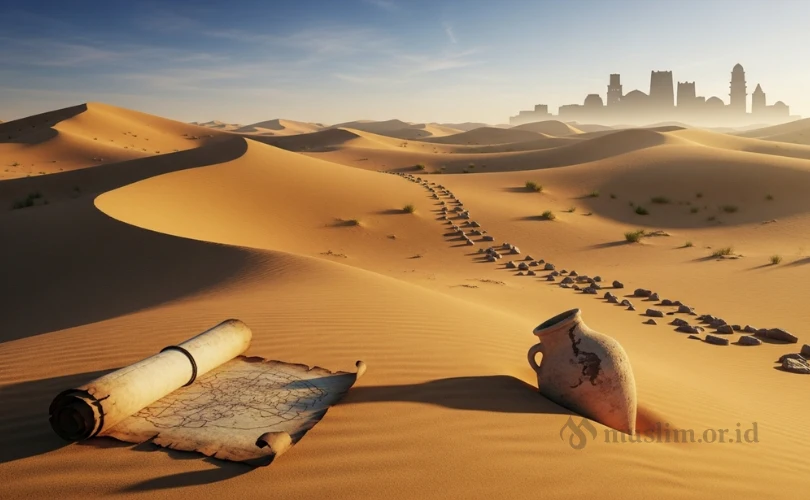In the previous article, we have traced the leadership of Mecca from the time of the Prophet Ismā’īl Alaihissalām To the power of the Khuzā’ah tribe. However, history has not ended there. In this article, we will see how the descendants of the Prophet Ismā’īl return to the leadership of Mecca through Qushay bin Kilāb.
Young Qushay bin Kilāb Muda (قصي بن كلاب) and his return to Mecca
Qushay is a son of Kilāb bin Murrah. Kilāb died when Qushay was in his mother’s care. After that incident, his mother remarried Rabi’ah bin Haram (ربيعة بن حرام), a man from the Bani ‘Udzrah. This second husband then brought the mother and Qushay to his home country on the outskirts of Syām. Thus, Qushay grew up in the area. After growing up, Qushay decided to return to Mecca, where the father lived.
When Qushay reached Mecca, the ruler of Mecca at that time was Hulail bin Hubsyyah (حليل بن حبشة) still from the Khuzā’ah tribe. Hulail has a daughter named Hubba (حبى). Long story short, Qushay proposed to Hubba. Hulail even sympathized with Qushay and finally he married his daughter to him. From the marriage, Qushay was blessed with several children, including Abdud Dār (عَبْدَ الدَّارِ), Abdu Manaf (عَبْدَ مَنَافٍ), and Abdul ‘Uzza (عَبْدَ الْعُزَّى).
Bloody disputes that changed the Qibla history
After Qushay’s descendants and abundant wealth and noble position, Hulail died. Then there was a dispute between the Khuzā’ah tribes and the Quraish tribes that finally raised the war between the two tribes. There are many versions that explain the causes of war. One of the verses is that Qushay sees that he has the right to care for the Kaaba and Mecca compared to the Khuza’āh and Bani Bakr tribes. He also saw that the Quraish tribes were true descendants of the Prophet Isma’il and his main figure. Then Qushay spoke with a number of Quraish men and children of Kinānah to drive out Khuzā’ah and Bani Bakr from Mecca. They agreed.
The war began with the entry of Qushay with his troops to Mecca from ‘Aqabah and said, “We are more important to take care of Mecca than you.” Qushay and the team began to attack Khuzā’ah and finally dominated Mecca. When Mecca was dominated, the Khuzā’ah and Bani Bakr then moved away from the Qushay team. However, Qushay continued to mobilize the team to attack them. In the end, battles did not move and there was a fierce war. Fighting causes many sacrifices from both sides.
Most of the conflict and the beginning of Qushay’s power over Mecca
After a while of war, the two groups finally called for peace. Then they pointed to Ya’mur bin ‘auf (يعمر بن عوف) as an mediator. Ya’mur then decided that Qushay was more entitled to the Ka’bah and Mecca management than Khuzā’ah. All murders committed by Qushay against them are considered to have fallen, while the murder committed by Khuzā’ah and Bani Bakr is obliged to pay Diyat. Finally, the strength of the Kaaba and Mecca was fully handed over to Qushay. Mecca events occurred in 440 AD. Thus, Qushay and his descendants became absolute ruler and religious leader for the Kaaba visited by Arabs from all corners of pirates.
Among the contributions of Qushay in Mecca is reuniting Quraysh from different places outside the city of Mecca into the city. He distributed residences to his people and set their respective places.
Inheritance and important departments held by Qushay
Among Qushay’s historic relics is the establishment Dārun Nadwah With that north of the Kaaba with the door facing the Kaaba. Darun Nadwah is a group of Quraish tribes who discuss their important things. Darun Nadwah has an important position for Quraysh, because it guarantees the unity of sound and solving the problem peacefully.
When Qushay came to power, he held several important positions, namely being a leader in Dārun nadwah, Panjar Panji War (even?), and Kaaba Key holder (Hijābah), and become a water provider (Siqāyatull Hajj) and food (Fresh Hajj) For pilgrims when they arrive in Mecca. Qushay will then submit a department to Abdud Dār, his eldest son. Qushay’s decision was accepted by his offspring until Abdu Manāf died.
Dispute between descendants of Qushay
After Abdu Manāf’s death, his descendants competed with the descendants of Abdud Dār to carry out these important departments. In the end, Quraish was divided into two groups and almost one war between the two. Fortunately, they call on each other for peace and share departmental holders. The Department of Water and Food Providers for pilgrims was finally held by the children of Abdu Manaf, while the Nadwah Darun department, the war flag, and the key holder of the Kaaba were held by the children of Abdud Dār.
In addition, the descendants of Abdu Manāf made a vote to determine who would hold the department. From the poll, the name of Hāsyim bin Abdu Manaf (هاشم بن عبد مناف). Thus, Hāsyim is a person who holds a food and beverage provider department for pilgrims throughout his life. After Hasyim died, the department was held by his brother, Al-Muththalib bin Abdu Manaf (المطلب بن عبد مناف). After al-Muththalib died, the department turned to Abdul Muththalib (عبد المطلب بن هاشم), the Prophet’s grandfather Shallālāu ‘alaaha wasallam. The department was changed by children of Abdul Muththalib descent until Islam came. In Islam, the Department of Water and Food Providers for Hajj is held by al-‘abbas bin Abdul Muththalib (العباس بن عبد المطلب).
Other important departments held by Quraish
In addition to the five main positions, the Quraysh District also holds another position. These other positions make them like forming a small state resembling a democratic state. They have a government structure and institution that resembles parliament and assemblies today. List of positions at the time: Al-Shuar, Tahjīr al -awāl, Exciting, Al-Esynāq, Al-‘uqāb, Al-QubbahAnd as-sifārah. Al-Shuar is the task of managing arrows to ask for decisions from idols. This position is held by Bani Jumah. Taḥjīr al-amshāl is the task of managing the performance and oath presented to idols, as well as resolving disputes and legal issues. This department is held by Sahm Bani.
Ash-Andūrā is the permit department held by Asad children. Al-Esynāq is the position of manager Diyat (ransom of murder) and fines held by Bani Taim. Al-‘uqāb is the banner department of the Quraish tribes held by Umayyah. Al-Qubbah is the position of regulator of the Military Campsite and the Cadre Troop Command. This position is held by the Bani Makhzūm. As-sifārah is a diplomatic representative department for other tribes where the department is held by the Bani ‘Adī.
That is the story of the transition of power over Mecca from the hands of the Khuza’ah tribe to the hands of the Quraysh tribes through the central figure of Qushay bin Kilāb. Even Quraish’s leadership continued and continued until the birth of the Prophet Muhammad Shalallalāhu ‘alaihi wasallam.
[Bersambung]
Back to section 4
***
Writer: Fajar Rianto
Article Muslim.or.id
Reference:
Extracted from the book Rahīq’s old area, The work of Sheikh Shafiyurrahmān al-Mubārakfūri and Ad-Sīrah An-Nebawiyah, The work of Ibn Hisyām; with some additional information.
Game Center
Game News
Review Film
Rumus Matematika
Anime Batch
Berita Terkini
Berita Terkini
Berita Terkini
Berita Terkini
review anime


